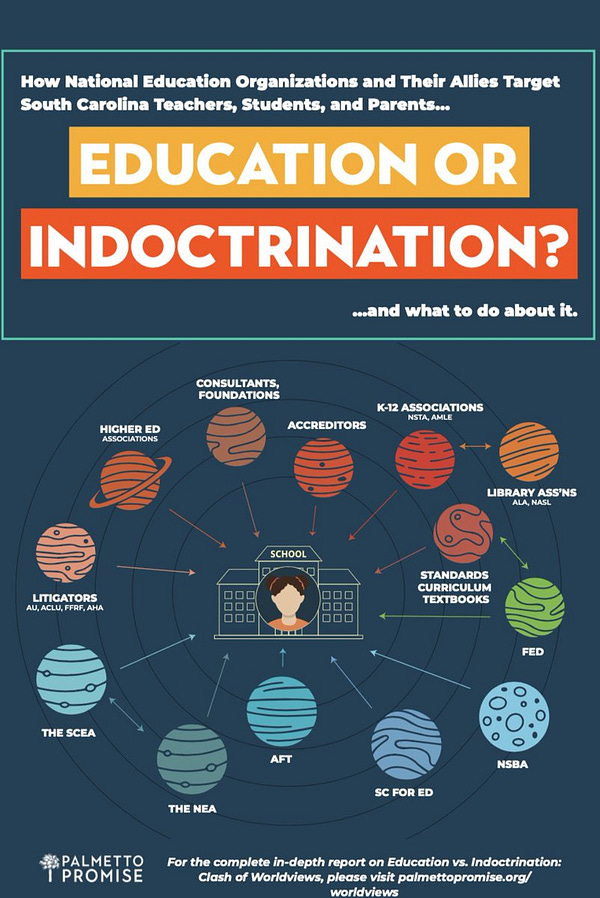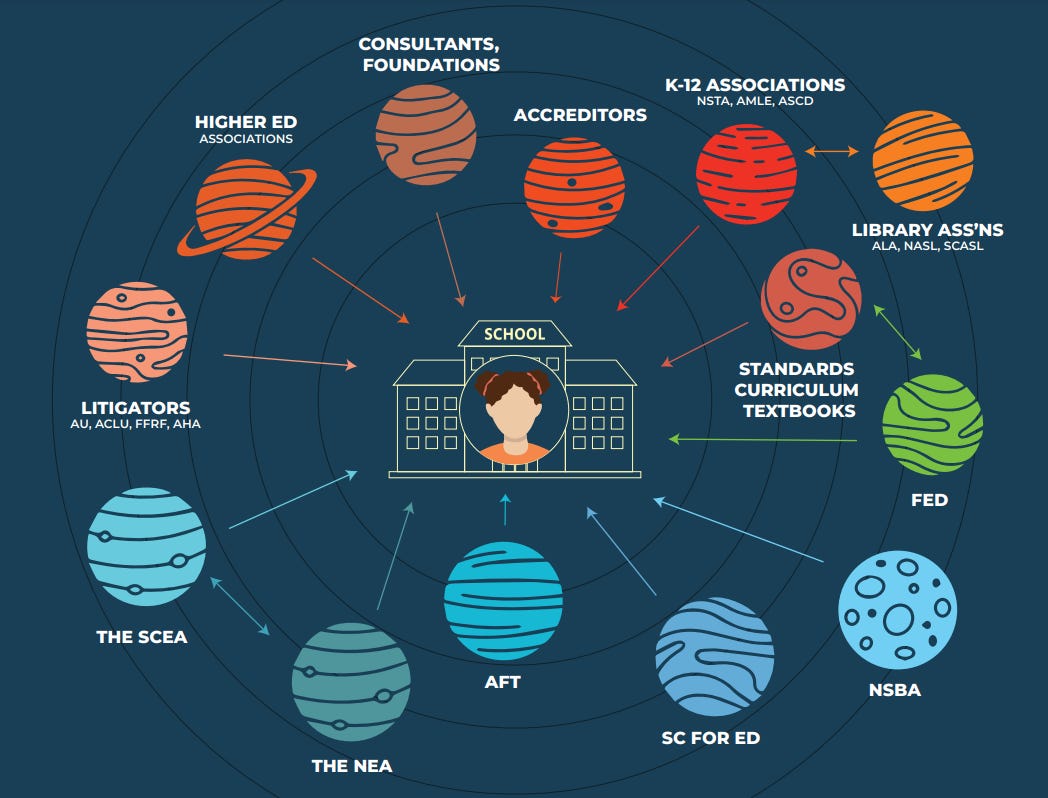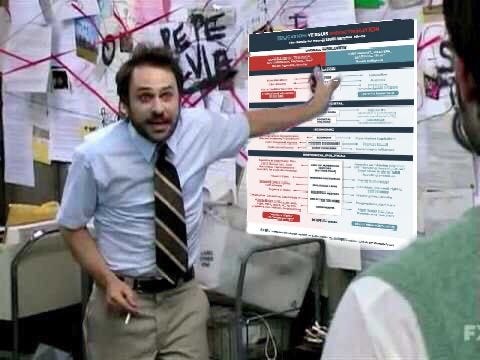Palmetto Promise’s Conspiracy Corkboard
and a partial analysis of Ellen Weaver's "transition team"
Teachers are overwhelmed with their duties and fearful of being stigmatized as well. That is why moderate and conservative teachers in South Carolina felt pressure to “like” posts of support for the left-of-center Facebook group SC for Ed in 2019, and why a large minority of teachers pay the dues that keep The South Carolina Education Association afloat.
-Education or Indoctrination, Palmetto Promise Institute
This week, incoming Superintendent of Education Ellen Weaver’s “think tank” dropped a crazy “dossier”. Or sometimes it’s “a report”— one without citations for most of its central and most outrageous claims. And sometimes it’s a “handbook”— one without much in the way of advice, except some version of support us and be mad at those teacher unions in NC and VA. It is probably not worth reading (although Paul Bowers, as usual, has done a service to mankind by partially breaking it down, and his observations are worth a read).



Teacher and writer Peter Greene also wrote an excellent analysis of the “dossier, which is worth checking out, as well.
I’ve already seen a lot of very well-earned online takedowns of this weird piece of propaganda, both from South Carolinians already familiar with Palmetto Promise and Weaver, and from national educational scholars like Jennifer Berkshire, co-author of the excellent Wolf at the Schoolhouse Door.
The document, and especially its accompanying graphics, are breathtakingly stupid. Aligning yourself with Aristotle on education policy— a philosopher who, on the one hand, explicitly called for public funding of education1 and, on the other hand, believed some human beings are physically and mentally designed to be slaves2— is quite a look for a pro-voucher think tank that doesn’t want people to think about “segregation academies” every time they hear “school choice”. Openly labeling “progressives” as “villains” is another. This thing was clearly cobbled together hastily by political hacks masquerading as scholars, in the vein of the 1776 Commission Report from the Trump Administration, and they clearly thought lots of colors and graphics would keep us dumb South Carolinians from thinking too hard about any of it.
Even a quick gloss over the “dossier” reveals claims that are unfounded and contrary to the general argument (privatization is good; Leftist woke indoctrinator teachers are “villains”). For example, the report claims that grassroots teacher advocacy group SC for Ed (I’m a board member) was primarily founded to oppose “schools of innovation” legislation. This seems to be a garbled reference to SC for Ed’s opposition to the education omnibus bill H. 3759, a legislative beast with a few good ideas glued to a lot of bad, often ALEC-drafted ideas. There is no citation provided, of course, because it isn’t true— I was there at the rally the “dossier” mentions, which was centered around many educational issues, and I was also there as a member of the group when the bill was just a twinkle in Jay Lucas’ eye. The omnibus bill, thankfully, did not pass, and the “schools of innovation” legislation that did pass, although not supported by SC for Ed, was certainly not some kind of major motivating factor for starting the group. The “dossier” goes on to use the “public-private partnership” Meeting Street Schools as its sole example of why the “schools of innovation” legislation was a good move. This is a weird rhetorical move during a week when, on “almost every criterion, Meeting Street Schools fell below both district and state performance,” according to Nick Reagan of WCSC.
But the thing is, it doesn’t need to make sense. The point isn’t to win over the undecided or to make any kind of cogent point. The point is to throw red meat to a minority of “parental rights,” “anti-woke,” and/ or fascist groups and activists. As Peter Greene explains,
Reports like this (all the way back to A Nation at Risk) provide ammunition to the ranters and ravers, allowing them to hold up the slickly produced official-looking pages and say, “I'm not just ranting and raving--what I have to say is supported by this sober academic report.”
I assume that getting liberals to sneer at graphics that literally look like a meme mocking conspiracy theorists is another part of the appeal.
So for me the only useful reason, for people engaged in good faith efforts to improve schools, to grapple with it (aside from a good laugh, which we all need) is that it allows us to see what we’re up against. In South Carolina, that means accepting that we are likely in for at least one term with a Superintendent of Education who not only lacks the basic qualifications, temperament, and motivations for the job, but is happy to embolden extremists with this kind of rhetoric.
Who uses this kind of rhetoric? Totalitarian governments and fascists. In Yevgeny Zamyatin’s WE, an early-1900s Russian novel which more or less invented the sci-fi dystopia as a satire of totalitarianism, the citizens (called “numbers” or “ciphers” depending on the translation) are periodically gathered for the “Day of the One Vote”. On this day, a single nameless candidate— called only “The Benefactor” in the novel— stands for office, and traditionally every citizen casts a vote for him.
I asked my students— high school freshmen and sophomores, who are reading the book right now— why the One State of the novel would hold a vote when the outcome is predetermined. Their answers were pretty good: To create the illusion of freedom, some suggested. To show that they are powerful. To “gaslight” citizens into believing there is unity.
When, in the novel, a rebel group apparently coordinates a large number of people in a protest where they refuse to participate in the One Vote, the government spins the occurrence as a unanimous vote for the Benefactor anyway, because, they say, anyone who didn’t vote for the Benefactor doesn’t count as a citizen.
Unlike the dossier authors, I’m not trying to suggest that my ideological opponents are, in fact connected to totalitarianism or indoctrination. Because that it silly. My point is that in their scaremongering they sound a lot more like what they claim to be afraid of than they might intend.
While right-wing “anti-woke” types— the most obvious audience for this “dossier”— are fond of (mis)quoting and (mis)citing 1984 (a book that would not exist without WE), the “dossier” is much more One State than freedom fighter, much more Big Brother than Winston Smith. After all, it deals with the obvious reality that thousands of teachers support at least some of the aims of SC for Ed, SCEA, and other educational advocacy groups, with the flippant, unsupported, and illogical claim that these teachers only did so out of a feeling of “pressure” (a pressure so intense that it also forced them to pay dues to SCEA?). And it starts from an even more obviously harmful and false position, which is that none of these organizations— full of people who work with children, many of whom are parents (the majority of teachers I know have children of their own who attend public schools)— could possibly want to help children (including their own children) and parents (including themselves) by improving public schools.

Again, that’s just a transparently stupid claim, but it isn’t a claim to win over enemies, or to inform the public; it’s a disinformation campaign to discredit legitimate critics. Lacking a cohesive rationale or strong research base for its only concrete goal— school vouchers— Palmetto Promise Institute/ Ellen Weaver rely on the same old scare tactics and ad hominem attacks they always have. Because they work.
But maybe the most galling claim implicit in the “dossier” and similar rhetoric— just look at Ellen Weaver’s whole successful campaign for Superintendent of Education to see it in its purest form— is that the big bad “teacher unions” are somehow in control of SC public schools. Despite the fact that South Carolina is quantifiably the most anti-union state in the nation. Despite the fact that folks like Ellen Weaver have been in control of the Education Oversight Committee for years (she was appointed by my former Senator, John Courson, who resigned after pleading guilty to ethics charges)3 and have presided over all of the real and imaginary problems with the education system which the "dossier" is pretending to attack. Despite the fact that they are funded by extremely wealthy and well-connected people and political interests. Despite the fact that— as the “dossier,” itself points out— they have been successful in passing many of their legislative priorities over the objections of thousands of teachers and school employees. Despite the fact that the main villains of their narrative— like the American Federation of Teachers— do not even have chapters in South Carolina, due in part to the very successful anti-union lobbying efforts of groups like Palmetto Promise.
Weaver’s recently-announced transition team is a great demonstration of both the power and the motivations behind the “dossier” and its associated school privatization movement. It includes:
Karen Whitley, who was appointed to the Berkeley County School Board after “Moms 4 Liberty” candidates became a board majority, and whose son, Berkeley County finance chair Josh Whitley, donated $1500 to Weaver’s campaign according to ethics filings.4 (Updated 12/15 to add: according to ABC News 4, some BCSD board members have questioned whether board policies were followed in hiring Karen Whitley, and according to the new superintendent, she does not have an employment contract with the district.)
former state treasurer Ken Wingate, who donated $1,700 to Weaver’s campaign according to ethics filings (see footnote 4)
Former SC Representative and former House Education and Public Works Chair Rita Allison, who has had a sometimes-positive history of supporting public schools, but who also presided over and pushed through last year’s big school censorship bill
Beaufort Schools Superintendent Frank Rodriguez, who recently moved to at least temporarily ban 97 library books
anti-abortion advocates without obvious connections to the public education system, such as Alexia Newman, head of a “crisis pregnancy center,” Pastor Bill Monroe of Florence Baptist Temple (which is in keeping with Weaver’s official candidate social media page celebrating of the Dobbs decision overturning Roe v. Wade). (Updated to add: Pastor Monroe is also president of a private religious school.)
business types without any apparent educational experience or expertise, like Peter Brown of Colite International, who donated $3,500 to Weaver’s campaign (and who would like you to know that part of the solution to Columbia’s homelessness problem is arresting more people who are homeless) and James Burns of Burns Chevrolet (he and his business donated at least $8,000 to Weaver’s campaign) (see footnote 4)
at least one private school teacher, Kristin Bohan, who helped found a Montessori charter school and donated $500 to Weaver’s campaign, and one private school operator (see footnote 4)
new Horry County School Board member David Koch, who made a small donation to Weaver’s campaign, and who said during his campaign, “It’s no secret there are many ideas and forces out there waiting to sneak their way into our children’s learning environment” and promised to fight “indoctrination” in schools. (He will probably really love the “dossier”.)
Of course, that’s not an exhaustive list, and there are a few people on the transition team who seem like promising additions— a Greenville Schools literacy specialist, an advocate for school counselors (don’t tell the people who wrote the dossier!), and a pastor whose wife is one of those Diversity Equity and Inclusion Officers whose “DEI agenda” the “dossier” is so freaked out by, to give a few examples— but overall, for anyone who closely followed Weaver’s campaign there should be no surprises. The team is made up of the same wealthy business types, far-right politicians, fans of censorship, and people vested deeply in the private school world, who were her biggest campaign supporters. And that, of course, is who the “dossier” is for. If you’re thinking critically about it, no matter your stances on public school policies, it isn’t really for you.
The folks at Palmetto Promise, like Weaver, want to be the master and tell you they’re the underdog— standing up bravely to the forces of the status quo— at the same time. If you’re pretty much on their wavelength politically, congratulations— you’re winning! If you want to feel like you are standing up for the marginalized, small groups of aggrieved parents are probably not it. Either way, if you don’t currently attend a South Carolina public school, or work in one, my advice is to talk to teachers, librarians, school staff, and students. Ask them what is happening. Ask them what they need, and what they think the state and the country need to do to turn things around for our public schools.
My guess is that is the last thing that the authors of the “dossier” want you to do.
Journalists and researchers, please feel free to use content from this or any other essay from this newsletter, but please do me a favor and include a link to the newsletter, and/ or send me an email for comment. That really helps me to continue to do this work. Another thing that helps is donating to one of those organizations Palmetto Promise wants to smear as “Leftist” indoctrinators. PPI even helped you out and made that weird planetary chart of most of them (although AFT does not have actually have any chapters in SC). My biased suggestions: donate to SC for Ed and/ or the SC ACLU.
In his Politics, Aristotle writes, “And since the whole city has one end, it is manifest that education should be one and the same for all, and that it should be public, and not private. - not as at present, when every one looks after his own children separately, and gives them separate instruction of the sort which he thinks best; the training in things which are of common interest should be the same for all. Neither must we suppose that any one of the citizens belongs to himself, for they all belong to the state, and are each of them a part of the state, and the care of each part is inseparable from the care of the whole” (Book Eight, Part I).
Earlier, in Book One, Part V, Aristotle writes, “But is there any one thus intended by nature to be a slave, and for whom such a condition is expedient and right, or rather is not all slavery a violation of nature?
“There is no difficulty in answering this question, on grounds both of reason and of fact. For that some should rule and others be ruled is a thing not only necessary, but expedient; from the hour of their birth, some are marked out for subjection, others for rule.”
The authors of the “dossier” suggest “Volunteering in a school, running for district board of trustees, or making your willingness to serve on state curriculum committees (or even the State Board of Education or Education Oversight Committee) [sic] can help right the ship and help ensure that education is not about indoctrination or stigmatizing one group or party or ideology for problems in our society.” Presumably, they mean readers should make their willingness to serve known, which says a lot about their perceived audience. I would love to serve on the EOC, but the Governor doesn’t generally return my messages.
I made a spreadsheet containing most of Weaver’s ethics filings information here. This version does not contain the names of small donors; if you want that information, you can visit this link to the SC Ethics Commission website, which is where all of this information originally came from.





